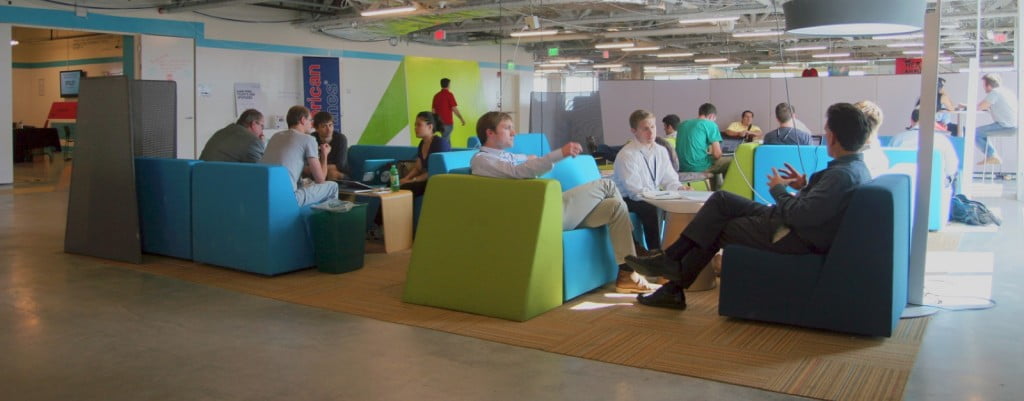For the past four years, Israeli startups have been welcomed at MassChallenge in Boston, the world’s largest accelerator. The mammoth accelerator, a nonprofit venture which takes up the whole 14th floor of a skyscraper in the heart of Boston’s innovation district, recruits 128 startups for three months every year (in honor of Massachusetts Route 128).
Founder and CEO John Harthorne last week visited Israel for the 2014 MassChallenge Israel launch ceremony, and sat down for a chat with NoCamels to talk about why he chose to launch MassChallenge’s first outside branch in the Startup Nation, which will be located in Haifa’s soon-to-be inaugurated and much talked-about Life Sciences Park.
“Israel was always the first [startup hub] we identified. It’s clearly an innovation-oriented ecosystem,” Harthorne tells NoCamels. “Every year of the program, there was at least one Israeli company to participate, but last year there were seven teams that came through MassChallenge Israel, one of which was from the Palestinian Authority.”
“No equity taken, No strings attached”
The first MassChallege contest, which selects from over 1,200 applications in over 40 countries, launched in 2010 and and so far, the 489 alumni have raised $472 million in outside funding, generated $194 million in revenue and created 4,000 jobs.
Unlike other accelerators, MassChallenge does not take equity from its participants. “We are the first to support entrepreneurs with no strings attached,” Harthorne tells NoCamels. “We originally planned to launch an accelerator [in Israel] and the first thing people said was ‘we don’t need another accelerator. What people need here is access to the international market.’ And that’s what we have in Boston. We know everybody. I can set up meetings for people that can fill four weeks out of their lives tomorrow.”
Launching a nonprofit accelerator in the midst of a recession
Harthorne explains why he launched MassChallenge in the midst of an economic recession: “It was a response to basically the rampant greed that is destroying the economy and society. When you think of business, you are making a ‘pie of value [to society]’ and you get to keep a slice of that in return for the work you put in,” Harthorne shares.
“You have to earn your slice though. You have to first do something of value. Too many people were focused on ‘how do I maximize the size of my slice,’ without any concern whatsoever to ‘how do I make more pie.’ So there was a hyper-competitive spirit, rather than a hyper-creative spirit – and that is the downfall of the economy,” Harthorne tells NoCamels.”
The next Red Cross to come out of MassChallenge?
In regards to his choice of making MassChallenge nonprofit, Harthorne says: “You introduce a significant conflict of interest when the accelerator is also taking equity from the startup. If you think about it, most accelerators are run by, and for, investors. Once [the startups] are on a fund-cycle, they have a certain number of years to exit that fund so it’s in their interest to accelerate the exit of the startup, and potentially to the harm of the founders and the startup’s long-term potential. We take a much longer term perspective.
Sign up for our free weekly newsletter
Subscribe“We’re interested in maximizing the impact on humanity and that will be better suited if they are a multi-billion-dollar company. But it could also be a nonprofit company, like the next Red Cross, and NoCamels could also be the type of program that could enter.”
“Being the patron of the Da Vincis of today”
Harthorne sees himself as part of a new Renaissance, using high-tech and entrepreneurship to usher in a new era for humanity. “We’d like to be like a patron of the Leonardo Da Vinci’s of today,” he says. “All of these people are hyper-engaged and optimistic and excited. They’re all staring at some of the world’s biggest problems in the face and saying: ‘I’m gonna fix it.'”
“With billions of people about the join the middle class over the next decade around the world, we have an opportunity to redefine the way business and people interact and literally have the opportunity to usher in a global renaissance, bigger and more exciting than the periods of enlightenment that we’ve seen in Europe, involving billions of people around the world.
“And you can see Israel will play a significant role as a natural hub of innovative activity with a large diaspora around the world,” Harthorne adds.
“Israel is only in the beginning stage of something that will be much bigger”
Harthorne often notes the similarities he sees between his home state of Massachusetts and the Startup Nation, particularly when it comes to feeling proud of where you come from: “I think it’s important to have a community that you belong to that you love. I think Israel is tremendous and there’s a lot of love for Israel in the Boston area. I think it’s an incredible country with incredibly talented people. Israelis should be proud.”
While some have said that the Israeli startup scene is on the decline, Harthorne says he believes it’s the complete opposite: “I think this is the beginning. I get calls from all over the world from people who dream to replicate the innovation ecosystem that has taken root in Boston, Silicon Valley, New York and Israel. And Israel is the example that everybody gives for how to do that. So I’m not personally worried at all about the Israeli ecosystem. I think that this is the beginning of something that’s going to get much bigger.”
Photos: courtesy of MassChallenge
Related posts

Editors’ & Readers’ Choice: 10 Favorite NoCamels Articles

Forward Facing: What Does The Future Hold For Israeli High-Tech?

Impact Innovation: Israeli Startups That Could Shape Our Future






Facebook comments